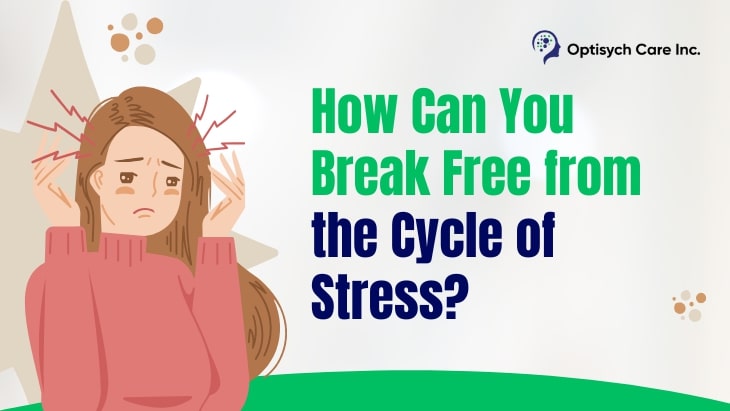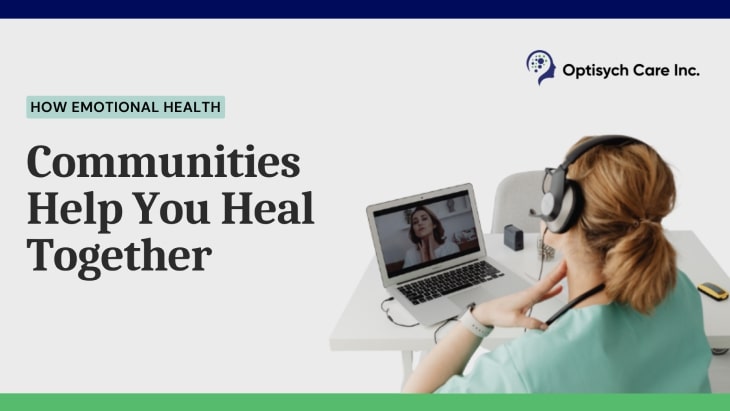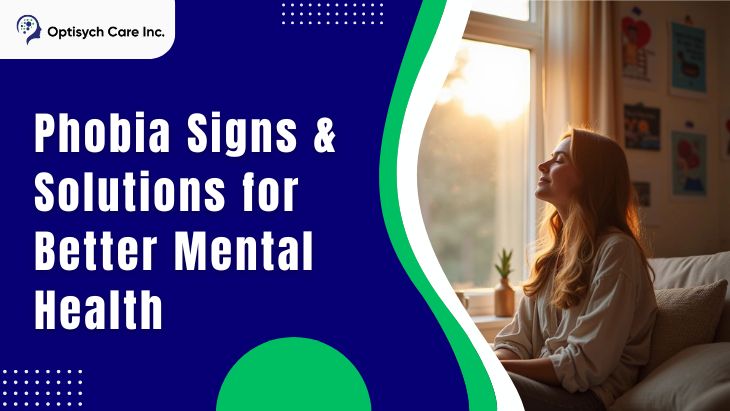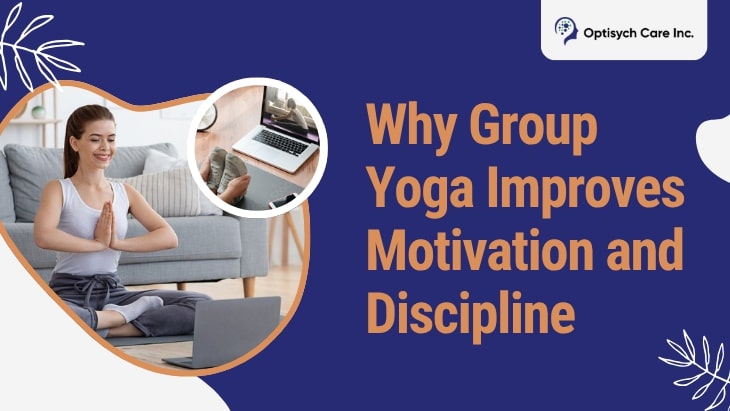Stress in the modern world is nearly an inseparable companion of a fast-paced and constantly connected world. Be it a meeting at the workplace, money, or other issues affecting us in life, most of us get stuck in a vicious cycle of anxiety, tiredness, and emotional burnout. This constant stress may culminate in what experts refer to as the cycle of stress—that burning out spurs worry and that worry spurs more burning out.
The fact is that moderate stress may stimulate us to better results, though when it becomes chronic, it may cause severe damage to physical and mental health. There is no need to escape the cycle, but to realize triggers, develop resilience and adopt healthy coping mechanisms to enable you to be in control.
With the assistance of the Best Online Therapy Platform and structured Employee Wellness Programs, nowadays people can find such convenient tools and professional assistance at the tip of their fingers.
Cycles of Stress
The first thing to come out of stress is to know how it functions. Once the body feels that there is a threat (be it physical or emotional) it becomes activated, and the body secretes hormones such as cortisol and adrenaline, which are known as fight-or-flight hormones. These substances speed up the heart rate, enhance your concentration and get you ready to deal with danger.
Nevertheless, when such a condition is continued because of continuous stressors, then your body does not have an opportunity to rest. In the long run, it results in chronic stress, a vicious circle, negative thoughts, fatigue, and poor habits supporting each other.
The typical symptoms of being trapped in this cycle are:
• Difficulty sleeping or insomnia.
• Numerous irritability or mood swings.
• Excessive thinking and impatience.
• The physical symptoms, such as headaches or muscle tension.
• The feeling of being overwhelmed all the time.
Being aware of these indicators at a young age will lead you towards the recovery effort before the issue of stress becomes a permanent issue in your health.
Usual Triggers of Long-Term Stress
Although the stressors of each individual are unique, some factors are considered to have a broad spectrum of causes of chronic stress:
• Pressure atWork and Deadlines: Productivity, working long hours, and strict deadlines may exhaust the employees and make them feel underestimated.
• Financial Issues: The uncertainty surrounding income, expenses, debt, etc., is a frequent source of mental stress.
• Relationship Conflicts: Emotional distress can be nourished through disagreements at a personal level, family problems, or emotional lack of support.
• Digital Overload: There is never an opportunity to recharge because of constant notifications, emails, and social media comparisons that can stifle the mind.
• Absence of Work-Life Balance: When one fails to practice self-care, hobbies, and rest, there is a problem of not being able to rest after a day.
The initial move towards coming up with workable measures to handle them is learning their causes.
The Effect of Stress over a Long Period
Stress does not only deal with your mood but also with your whole health and performance.
• Physical Effects: Continuous stress can lead to headaches, fatigue, muscle aches, digestive problems and even threaten to lead to heart disease.
• Effects on Mental Health: Stress is a significant cause of anxiety, depression, and emotional burnout. It distorts rationality, causes lack of attention, and makes one irritable.
• Loss of Productivity: A stressed mind cannot give their attention and make judgments effectively, and this results in mistakes, lack of time meeting deadlines, and lack of creativity.
• Relationship Strain: When stress is great, communication will fail and misunderstanding and isolation will occur.
The outcomes here point to why it is important to recognize stress at the initial stages and apply the resources, such as mindfulness, therapy, or employee wellness programs, to restore the balance.
Steps to Escaping the Cycle
The stress cycle is hard to overcome without regular practice, self-knowledge, and proper guidance. The following are some of the strategies that have been proven:
1. Identify and Accept Your Stress
Healing is based on self-knowledge. Take time to think about how you feel and what triggers your feelings and habits. Journaling may assist you in determining the patterns, like when or why stress is the highest. Being aware of stress does not mean that you are weak, but it is a sign that you are willing to take charge.
2. Mindful Breathing and Relaxation
There are methods such as deep breathing, meditation and progressive muscle relaxation, which help in calming the nervous system. Even a couple of minutes of meditation in a day can help to calm down and enhance concentration. Attempt to take five minutes of quiet morning or evening to get grounded.
3. Set Healthy Boundaries
It is self-care to say no. Establish boundaries on the amount of work, social and screen time. Lists or time-scheduling software—prioritize tasks and delegate where you can. Boundaries help to conserve your energy and avoid emotional burnout.
4. Adopt a Balanced Lifestyle
Physical well-being has a direct impact on mental well-being. Exercise, eating healthy foods and getting enough sleep are essential to resilience. A brisk 30-minute walk can also do it, even in a day; endorphins are the natural stress relievers of the body.
5. Limit Digital Distractions
Modern stress is perpetrated by digital overload. Switch off redundant alerts, establish technology-free areas, and reduce social media usage. Taking back your cyberspace will help your brain to rejuvenate.
6. Seek Support When Needed
At times, stress management may be too cumbersome. Conversation with a close friend, relative or therapist can provide relief and perspective.
This is where the contemporary tools, such as the Best Online Therapy Platform, come in to transform the situation. Confidential, convenient and accessible mental health support Online therapy delivers confidentially, conveniently and affordably, as well as making you available to licensed professionals who can guide you through a recovery process during stress management, anxiety, or burnout, wherever you may be.
The Professional Help Role
Although lifestyle change is necessary, professional guidance can be the structure and accountability needed to make permanent change.
They can be assisted by therapists and counselors:
• Determine the underlying causes of chronic stress.
• Change negative thinking styles.
• Learn to cope with your style of life.
• Become more emotionally resilient by using evidence-based strategies.
Employee wellness programs are also taking the mental health of employees seriously in most workplaces today. Such programs provide mindfulness courses, counseling opportunities and flexible work schedules to promote mental and emotional health.
Working with the Best Online Therapy Platform will be an addition to these programs, as employees have 24/7 access to professional therapists. The two form an entire support system that minimizes absenteeism and boosts morale as well as workplace performance.
Early intervention is key. It is better to get assistance before stress can get to your head and protect your health in the long run. It is important to remember that seeking help is a sign of power and not weakness.
Creating a Long-Term Stress-Free Mind
The process of breaking the cycle of stress is not a one-time event but a continuous self-care, self-reflection and self-improvement process.
This is the way you can develop a strong, stress-resistant mentality:
• Be Grateful: Take time every day and remind yourself of what is working out. Appreciation makes you change your mindset from stress to gratitude.
• Train Emotional Intelligence: Learn how to feel and respond. It is better to respond in a cogent manner rather than to react in crisis to minimize conflict and anxiety.
• Have Fun and Spend Time in Nature: Creative actions, hikes, or even time in nature will refresh your mind and make your sense of being healthy stronger.
• Be Connected: Supportive Relationship. Tying oneself to social networks is a strong antistress factor.
• Focus on Smaller Wins: Each move towards calmness matters. Congratulate your progress, even the slightest.
Being calm does not imply living a problem-free life but having the means and coming out of them with calm and caring hands.
Conclusion
Stress can be a given aspect of contemporary life, but being caught in the loop of it is not. Creating healthy coping strategies, identifying your triggers, and getting the appropriate support will help you to take control of the situation and achieve long-term peace of mind.
Stress management today is more available than ever with the help of modern tools such as employee wellness programs and the best online therapy platform. Whether you are a personal user who needs to relax or a business manager who needs to help his subordinates, professional guidance can change the way you perform in your relationship with mental health and well-being.
The process of getting out of the stress is not an overnight process and involves taking a step towards yourself and the process of self-awareness and self-care.
Are you willing to begin your path to harmony, clarity and emotional freedom? Contact Optisych Care now. Their professionals will provide you with the professional, caring, and evidence-based assistance with online therapy that is easily accessible and personalized wellness programs created to make your life healthier and devoid of stress.






Leave a reply